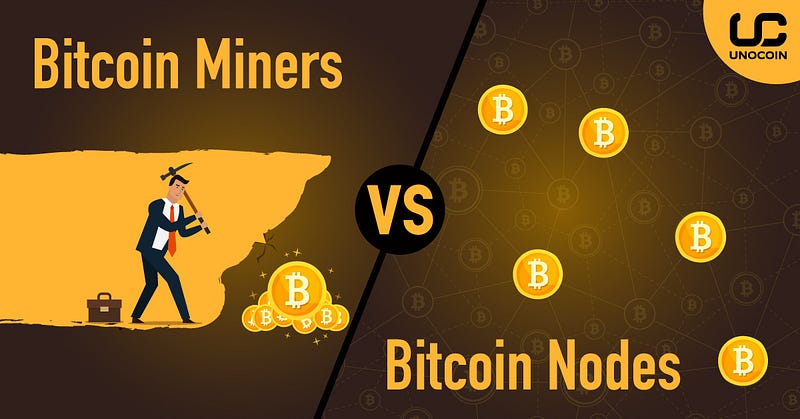
Since Bitcoin is decentralised, no central authority is in control. The entire system is governed by a set of rules that apply equally to everyone. Since it is based on cryptography, these rules involve doing a lot of math to keep the system going. The system is kept going by two kinds of entities — miners and nodes. Before we better understand what the two do, here’s a quick recap of some basic Bitcoin terms to help you understand it all better.
- Blockchain — Bitcoin’s ledger. The Blockchain is a public record and can be stored by anyone. The Blockchain stores all transaction data.
- Mining — the process by which Bitcoin transactions are validated using special processors. The people who do this are called miners.
- Node — A server or storage device which stores the entire Blockchain and runs a Bitcoin client software that peruses all transaction data and the Blockchain to check if they conform to Bitcoin protocol.
- Bitcoin wallet — A software application in which you can view your Bitcoin holdings, and send or receive Bitcoins.
- Bitcoin wallet address — Your wallet address is equivalent to your bank account number. Bitcoins are stored against this address/ID. Each wallet address is associated with two unique keys, called public and private keys.
- Public key — The public key is used to send Bitcoins to you and can be seen by anyone. The private key is your password and you need it to spend your Bitcoins.
Bitcoin mining
After you send Bitcoins using a Bitcoin wallet, this transaction information is relayed throughout the network — passes from node to node (from a server to server) until it is transmitted to all the nodes.
- The miners then pick up this transaction information from nodes and perform a special process called mining on it, typically by using special processors called Application Specific Integrated Circuits (ASICs).
- The transaction information is then converted into a unique 32 character length string called hash.
- After hashing a transaction, miners then link it with the immediate preceding hash and thus create a chain of transactions after mining a few and linking them together. This chain of mined transactions is called a block.
- The block is then linked to the previous block using the previous block hash found on the Blockchain.
- Miners need constant access to nodes to pick up new transaction data and also to find the preceding block’s hash. Miners, in addition to mining, can also set up their own nodes and almost every miner has a local node set up.
After mining is complete, the miner sends the transaction info of all transactions mined along with the new block to all nodes. The information is relayed from node to node to reach all nodes. Miners get a transaction fee from users as a reward for securing transactions while the system also rewards them with Bitcoins that are generated anew with the creation of every new block.
Bitcoin nodes
As mentioned earlier, Bitcoin nodes are storage devices with access to the internet that store all the transaction data from the very start as a chain of information called the Blockchain.
- They also run Bitcoin software that enforces Bitcoin rules/protocol. The Blockchain can’t be tampered with, as any change to the transaction data changes the unique hash and exposes the cheating node.
- Also, no transactions can be deleted as each is linked to the preceding one and any disruption is easily detectable.
The nodes function to relay transaction information from users to miners and also to store the Blockchain. Nodes synchronise with each other and even if a node is offline for some time, it’ll download the latest data from other nodes once it gains access to the internet. Also, the nodes check every transaction and hash generated by miners to see if transaction data corresponds to hash generated by miners. The nodes also confirm that all data complies with the Bitcoin protocol. Any aberrant transaction that doesn’t conform to the Bitcoin protocol is rejected. Once mined and added to the Blockchain, it’s very hard and costly (could cost as much as $30 billion to falsify one transaction) to change the record held by nodes.
Since there are thousands of nodes worldwide, the Bitcoin network is very hard to shut down. Any rogue node can be identified by comparing it with the rest and can be isolated quickly. Anyone with a storage device with sufficient space connected to the internet can run a node.
Both miners and nodes act in concert to enable the Bitcoin network and are the pillars on which Bitcoin rests. Together, they create a system immune to external manipulation, tampering or censorship and fulfill the promise of Bitcoin.
Also Read:
https://blog.unocoin.com/katy-perry-is-learning-about-bitcoin-from-warren-buffett-47f38b90599
